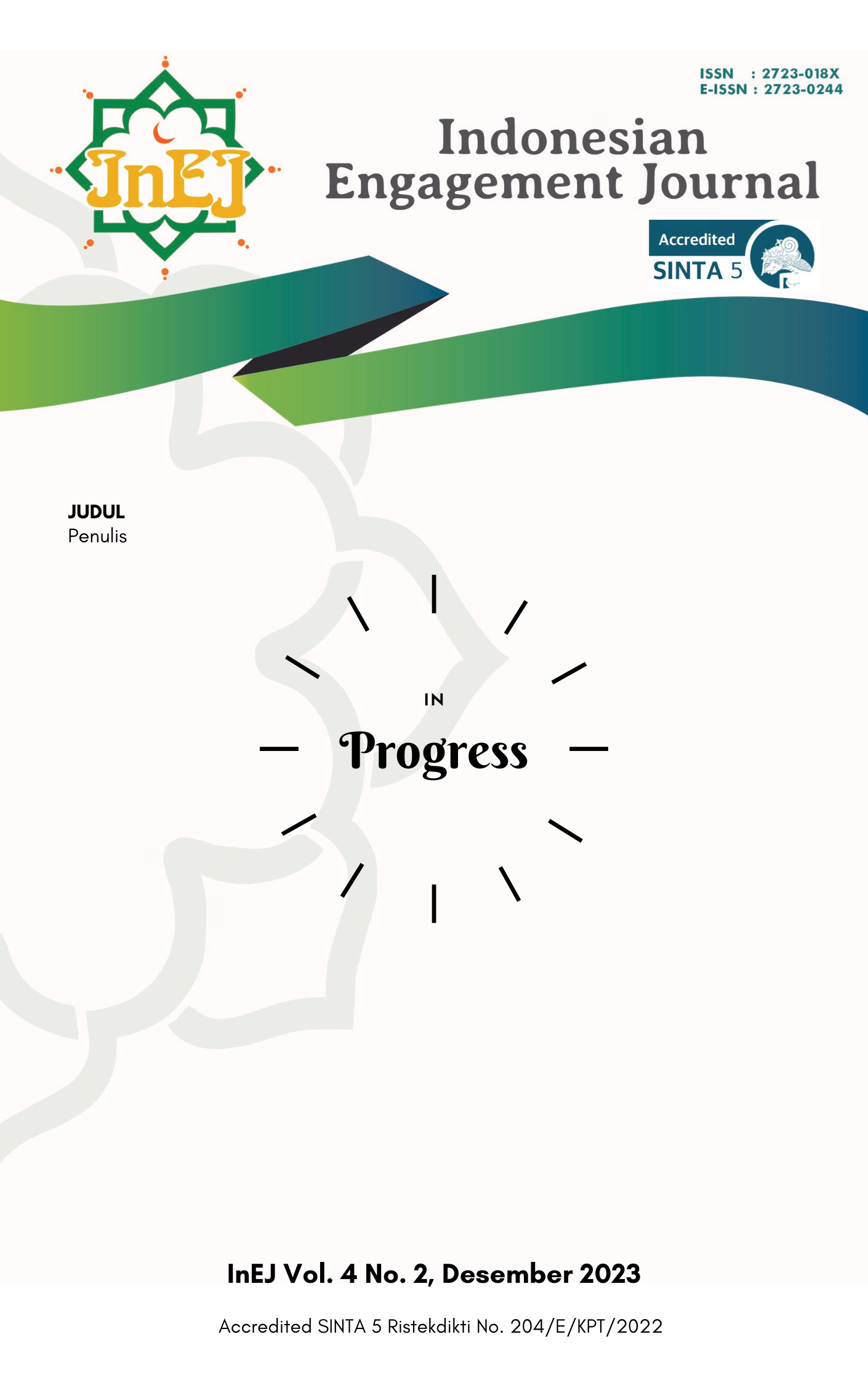IMPLEMENTASI METODE EXPERIENTAL LEARNING DALAM MENANAMKAN NILAI NILAI DALAM HADIST TENTANG ADAB MAKAN UNTUK ANAK USIA DINI
DOI:
https://doi.org/10.21154/inej.v4i2.8416Keywords:
Metode Experiental learning, Hadits Tentang Adab Makan, PAUDAbstract
Di zaman Z sekarang ini banyak di lihat anak -anak kurang melibatkan adab dalam setiap kegiatan, yang mana hal ini juga di pengaruhi oleh zaman dan juga lingkungannya. Akan tetapi, hal ini juga tidak sepenuhnya salah dari pergaulan ataupun lingkungan di sekitar anak, melainkan juga dari didikan keluarganya di rumah. Fenomena ini di lihat dari adab anak dalam makan dan minum, banyak sekarang ini halayak yang makan dan minum tanpa adab yang mana telah di ajarkan oleh nabi muhammad SAW. Tujuan dari penelitian ini adalah mengeksplorasi dan menganalisis implementasi metode experiental learning dalam menanamkan nilai-nilai dalam hadits tentang adab makan kepada anak usia dini. Fokus penelitian ini adalah hadits tentang adab makan dalam islam dengan tujuan untuk mendidik anak usia dini tentang adab makan yang benar. Adapun hasil penelitian ini pada pembelajaran anak guru harus melibatkan pengalaman langsung dan partisipatif untuk meningkatkan pemahaman dan penerimaan nilai -nilai islam dalam kehidupan sehari-hari. Dan diharapkan penelitian ini dapat memberikan kontribusi aktif bagi pengembangan metode pembelajaran yang lebih inovatif dan efektif dalam mendidik anak usia dini tentang nilai-nilai agama, khususnya yang berkaitan yang dengan kebiasaan makan. Penerapan metode experiental learning dapat menjadi pilihan menarik untuk melahirkan generasi yang memiliki pemahaman lebih mendalam terhadap ajaran islam sejak dini.
References
Adityasari, P. (n.d.). Disusun sebagai salah satu syarat untuk memperoleh Gelar Sarjana Pendidikan Program Studi Pendidikan Guru Pendidikan Anak Usia Dini.
Ahmad, A., & Palangkey, R. D. (n.d.). Konsep Pendidikan Anak Usia Dini Perspektif Hadits Nabi Muhammad Saw.
Akbar, E. (2020). Metode belajar anak usia dini. Prenada Media.
Ardoin, N. M., & Bowers, A. W. (2020). Early childhood environmental education: A systematic review of the research literature. Educational Research Review, 31, 100353. https://doi.org/10.1016/j.edurev.2020.100353
Arifudin, O., Hasbi, I., Setiawati, E., Supeningsih, S., Lestariningrum, A., Suyatno, A., Umiyati, U., Fitriana, F., Puspita, Y., & Saputro, A. N. C. (2021). Konsep Dasar Pendidikan Anak Usia Dini.
Atabik, A., & Burhanuddin, A. (2008). Prinsip dan Metode Pendidikan Pada Anak Usia Dini. Thufula, 3(2), 264”“280.
Desa, D. I., & Barat, P. (2022). Instilling Religious Values in Early Childhood. 2, 50”“59.
Gadola, M., & Chindamo, D. (2019). Experiential learning in engineering education: The role of student design competitions and a case study. International Journal of Mechanical Engineering Education, 47(1), 3”“22. https://doi.org/10.1177/0306419017749580
Ilmu, F., Dan, T., Islam, U., & Walisongo, N. (2021). Penggunaan Metode Experiential Learning Tpq Darul Hijrah Wonosari Semarang.
Jazilurrahman, J., Widat, F., Widat, F., Tohet, M., Tohet, M., Murniati, M., Murniati, M., Nafi’ah, T., & Nafi’ah, T. (2022). Implementasi Metode Bercerita dalam Meningkatkan Kecerdasan Interpersonal Anak Usia Dini. Jurnal Obsesi : Jurnal Pendidikan Anak Usia Dini, 6(4), 3291”“3299. https://doi.org/10.31004/obsesi.v6i4.2095
Latifah, S. N. (n.d.). Penggunaan metode Experiential Learning dalam pembelajaran adab makan santri TPQ Darul Hijrah Wonosari Semarang.
Mardiah, S. (2023). Pemahaman dan Aplikasi Nilai-Nilai Adab Makan dan Minum Melalui Animasi Kartun Islami Di RA El Syarifah Medan. 06(01).
Morris, T. H. (2020). Experiential learning ”“ a systematic review and revision of Kolb’s model. Interactive Learning Environments, 28(8), 1064”“1077. https://doi.org/10.1080/10494820.2019.1570279
Nada, A. A. F. A.-S., & al-Atsari, A. I. (2007). Ensiklopedi Adab Islam Menurut Al-Qur-an Dan as-Sunnah. Pustaka Imam Asy-Syafi’i.
Nuryati, N. (2017). Pembelajaran Hadis untuk Anak Usia Dini. 2, 273”“284.
Pratiwi Sapani Tanjung, I. S. H. (2020). Pengaruh Pola Komunikasi Verbal Orang Tua Terhadap Kemampuan Berbicara Anak Usia Dini. Jurnal Pendidikan Tambusai, 4(3), 3380”“3386.
Qibt, A. S. (2021). Hadits Larangan Tentang Meniup Makanan dan Minuman yang Panas. IJOIS: Indonesian Journal of Islamic Studies, 2(2), 159”“179.
Saputra, A. (2018). Pendidikan Anak pada Usia Dini. At-Ta’dib: Jurnal Ilmiah Pendidikan Agama Islam, 10, 192”“209.
Smeer, Z. B. (2009). Kajian Hadis-Hadis Etika Makan Ditinjau Dari Aspek Kesehatan. El Harakah (Terakreditasi), 11(2), 85. https://doi.org/10.18860/el.v11i2.5208
Sohrah, S. (2016a). Etika Makan dan Minum dalam Pandangan Syariah. Al Daulah: Jurnal Hukum Pidana Dan Ketatanegaraan, 5(1), 21”“41.
Sohrah, S. (2016b). Etika Makan dan Minum dalam Pandangan Syariah. Al Daulah: Jurnal Hukum Pidana Dan Ketatanegaraan, 5(1), 21”“41.
Steed, E. A., & Leech, N. (2021). Shifting to Remote Learning During COVID-19: Differences for Early Childhood and Early Childhood Special Education Teachers. Early Childhood Education Journal, 49(5), 789”“798. https://doi.org/10.1007/s10643-021-01218-w.
Suryaningsih, A., Cahaya, I. M. E., & Poerwati, C. E. (2019). Implementasi Metode Experiential Learning dalam Menumbuhkan Perilaku Kesehatan dan Keselamatan Anak Usia Dini. Jurnal Obsesi: Jurnal Pendidikan Anak Usia Dini, 4(1), 187. https://doi.org/10.31004/obsesi.v4i1.317.
Tinanoff, N., Baez, R. J., Diaz Guillory, C., Donly, K. J., Feldens, C. A., McGrath, C., Phantumvanit, P., Pitts, N. B., Seow, W. K., Sharkov, N., Songpaisan, Y., & Twetman, S. (2019). Early childhood caries epidemiology, aetiology, risk assessment, societal burden, management, education, and policy: Global perspective. International Journal of Paediatric Dentistry, 29(3), 238”“248. https://doi.org/10.1111/ipd.12484.
Varman, S. D., Cliff, D. P., Jones, R. A., Hammersley, M. L., Zhang, Z., Charlton, K., & Kelly, B. (2021). Experiential Learning Interventions and Healthy Eating Outcomes in Children: A Systematic Literature Review. International Journal of Environmental Research and Public Health, 18(20), 10824. https://doi.org/10.3390/ijerph182010824.
Yusantika, F. D. (2023). Pembiasaan adab makan dan minum untuk menanamkan karakter religius melalui video animasi bagi SDI Sabilillah Malang. JIEES: Journal of Islamic Education at Elementary School, 4(1), 18”“27.
Yuswati, H., & Setiawati, F. A. (2022). Peran Orang Tua dalam Mengembangkan Bahasa Anak Pada Usia 5-6 Tahun. Jurnal Obsesi: Jurnal Pendidikan Anak Usia Dini, 6(5), 5029”“5040. https://doi.org/10.31004/obsesi.v6i5.2908.
Downloads
Published
Issue
Section
License
Please find the rights and licenses in InEJ. By submitting the article/manuscript of the article, the author(s) agree with this policy. No specific document sign-off is required.1. License
The non-commercial use of the article will be governed by the Creative Commons Attribution license as currently displayed on Creative Commons Attribution-NonCommercial-ShareAlike 4.0 International License.
2. Author(s)' Warranties
The author warrants that the article is original, written by stated author(s), has not been published before, contains no unlawful statements, does not infringe the rights of others, is subject to copyright that is vested exclusively in the author and free of any third party rights, and that any necessary written permissions to quote from other sources have been obtained by the author(s).
3. User/Public Rights
The spirit of InEJ is to disseminate articles published are as free as possible. Under the Creative Commons license, InEJ permits users to copy, distribute, display, and perform the work for non-commercial purposes only. Users will also need to attribute authors and InEJ on distributing works in the journal and other media of publications. Unless otherwise stated, the authors are public entities as soon as their articles got published.
4. Rights of Authors
Authors retain all their rights to the published works, such as (but not limited to) the following rights;
Copyright and other proprietary rights relating to the article, such as patent rights,
The right to use the substance of the article in own future works, including lectures and books,
The right to reproduce the article for own purposes,
The right to self-archive the article,
The right to enter into separate, additional contractual arrangements for the non-exclusive distribution of the article's published version (e.g., post it to an institutional repository or publish it in a book), with an acknowledgment of its initial publication in this journal (InEJ: Indonesian Engagement Journal).
5. Co-Authorship
If the article was jointly prepared by more than one author, any authors submitting the manuscript warrants that he/she has been authorized by all co-authors to be agreed on this copyright and license notice (agreement) on their behalf, and agrees to inform his/her co-authors of the terms of this policy. InEJ will not be held liable for anything that may arise due to the author(s) internal dispute. InEJ will only communicate with the corresponding author.
6. Royalties
Being an open accessed journal and disseminating articles for free under the Creative Commons license term mentioned, author(s) aware that InEJ entitles the author(s) to no royalties or other fees.
7. Miscellaneous
InEJ will publish the article (or have it published) in the journal if the article’s editorial process is successfully completed. The editors of Journal may modify the article to a style of punctuation, spelling, capitalization, referencing and usage that deems appropriate. The author acknowledges that the article may be published so that it will be publicly accessible and such access will be free of charge for the readers as mentioned in point 3.




